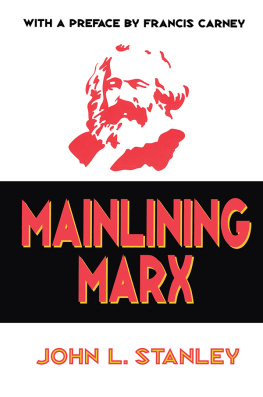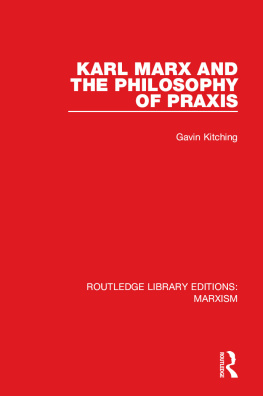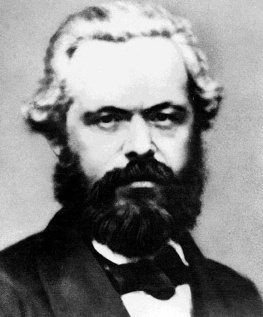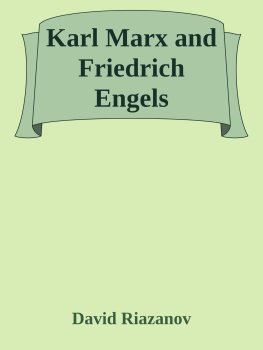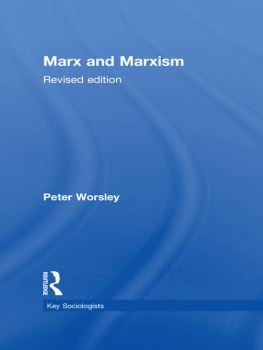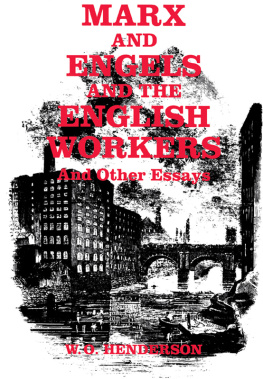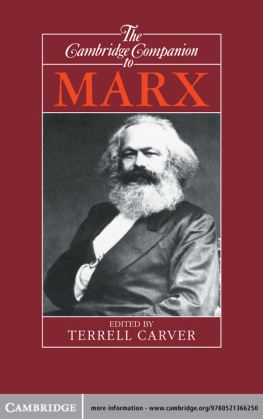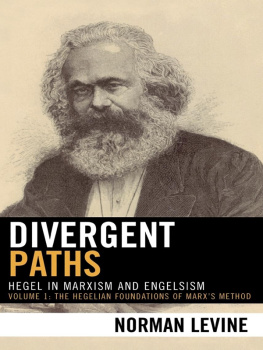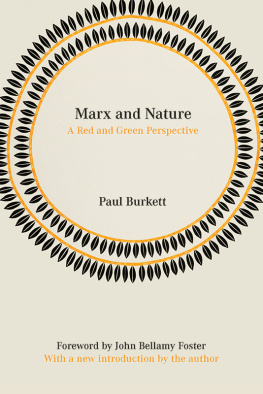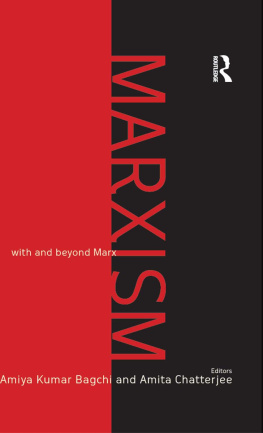First published 2002 by Transaction Publishers
Published 2017 by Routledge
2 Park Square, Milton Park, Abingdon, Oxon 0X14 4RN
711 Third Avenue, New York, NY 10017, USA
Routledge is an imprint of the Taylor & Francis Group, an informa business
All rights reserved. No part of this book may be reprinted or reproduced or utilised in any form or by any electronic, mechanical, or other means, now known or hereafter invented, including photocopying and recording, or in any information storage or retrieval system, without permission in writing from the publishers.
Notice:
Product or corporate names may be trademarks or registered trademarks, and are used only for identification and explanation without intent to infringe.
Library of Congress Catalog Number: 2001052300
Library of Congress Cataloging-in-Publication Data
Stanley, John, 1937-
Mainling Marx / John L. Stanley ; with a preface by Francis Carney.
p. cm.
Includes bibliographical references and index.
ISBN: 0-7658-0079-9
1. Marx, Karl, 1818-1883. 2. Engels, Friedrich, 1820-1895. 3.
Sorel, Georges, 1847-1922. I. Title.
HX39.5 S775 2001
335.4dc21
2001052300
ISBN 13: 978-0-7658-0079-4 (hbk)
The chapters in this book are reprinted with kind permission of the original publications:
Marx, Engels and the Administration of Nature, History of Political Thought, Vol. XII No. 4, Winter 1991.
On the Alleged Differences between Marx and Engels, co-authored by Ernest Zimmerman, Political Studies, Vol. XXXII, No. 2, June 1984.
Marxs Critique of Hegels Philosophy of Nature, Science & Society, Fall 1997.
The Marxism of Marxs Doctoral Dissertation, Journal of the History of Philosophy, 1997, 1.
The Uncertainties of Politics and Texts: Modern Marxists and the Dialectics of Nature, The Politcal Science Reviewer, Vol. XXIII, 1994.
The Education of the Passions in Marxs Social Reconstruction of Nature, in The Construction of Nature, Odense University Press, Odense, Denmark, 1994.
Hermeneutics and the Sciences was first published as the Introduction to From Georges Sorel 2: Hermeneutics and the Sciences, John L. Stanley, editor, Transaction Publishers, 1990.
With the death of John Langley Stanley in February of 1998, the University of California at Riverside and the entire scholarly world lost a brilliant teacher of political philosophy and an internationally respected scholar.
Johns former students delivered their message about the loss of this superb teacher in the form of a surprising number of letters and telephone and e-mail messages to the campus from all over the country. The gist of the collective expression was that John was one of the best or THE best teacher any of them had ever encountered. But those of us in Political Science already knew that, as we had been hearing it from students for three decades in both face-to-face encounters and in the mass from their comments on the course evaluation forms. In the corridors of Watkins Hall, Stanley was a striking and unforgettable physical presence. Partly this was due to his restless vitality, but mostly due to his resonant voice articulating a flawless American English. For many of us it is hard to live with the thought of not hearing him again in the corridors or at meetings.
John Langley Stanley was born in Boston, Massachusetts in November 1937 and spent his early years in Newton Highlands. His family moved to Rye, New York where he was educated in the public schools and then for a year at the Trinity Pawling School in Pawling, New York. He matriculated at Kenyon College in Ohio in 1956 and graduated with honors in Political Science four years later. Stanley enjoyed a year at Selwyn College, Cambridge, where he studied modem European history. In 1961 he enrolled in the doctoral program of the Government Department at Cornell University, after being awarded a prestigious Woodrow Wilson Fellowship. There he concentrated on American government and political theory, particularly the intellectual contributions of Georges Sorel.
In the fifties and sixties, Sorels reputation was at its nadir. Cursed as an apostle of violence or a precursor of fascism (Sartre labeled his works fascist utterances), or as an advocate of elitism, as well as having been dismissed by Lenin as a professor of confusion, Sorel appeared to be ready for the dustbin of history. John Stanley saved him from this fate. While still in graduate school and before arriving at UC Riverside in 1965, Stanley, with the collaboration of his wife Charlotte, began a translation of Sorels The Illusions of Progress. That translation was published in 1969 to a warm critical welcome. The work included an extended introduction by John, and with that publication we can say that the modem study of Sorel began. Johns project was not to rehabilitate Sorel, although some rehabilitation was accomplished by the time he had finished writing about him. Rather, John wanted to make a thorough and analytical investigation of the corpus of Sorels works. He showed Sorels work to be nuanced and learned, though not popular in an age in love with the doctrine of progress. In From Georges Sorel: Essays in Socialism and Philosophy, a compilation of selections of Sorels works translated by John and Charlotte with an introduction by John, he continued his serious close examination of Sorel and along the way convincingly shattered the notion that Sorel was a precursor of fascism or a reactionary authoritarian. His masterwork on Sorel was The Sociology of Virtue: The Political and Social Theories of Georges Sorel, published in 1981. That established Johns reputation as arguably the worlds leading authority on Sorel. Two other translations followed, including one of a work that Sorel had written in Italian, and to accomplish this John learned Italian. His last Sorel book, published in 1990, was From Georges Sorel vol. 2: Hermeneutics and the Sciences, in which he presented and analyzed Sorels writings on interpretive problems in religion, art, science and political theory.
There are few testable hypotheses in political theory, yet John was always alert to the possibility of finding counter-examples to his own beliefs as well as the assertions of others. A memorable example was his response to Hannah Arendt, who had proposed that totalitarianism was an invention of the twentieth century. In an article (1987) in The Review of Politics, John pointed out features of Shakas rule of the zulu empire in the early nineteenth century that corresponded to Arendts definition of totalitarianism. To look beyond the traditional domains of Europe and Asia was typical of the originality and compass of Johns thought.
With the same intellectual courage and insight that led him to Sorel, John, acting on Hegels dictum that the owl of Minerva rises at dusk, turned his attention to Marx, specifically challenging the stance of a group of Western Marxists who were attempting to present Marxism with a human face, dissociating him from Engels and scientific determinism. John would have none of this, and proceeded, in a series of six articles in scholarly journals, to delve into the early Marx, Marxs critique of Hegel and his relation to Engels dialectics of nature, among other topics. Along the way he demonstrated his originality and changed the views on Marx of more than a few scholars. He was well into writing a comprehensive work on Marxs View of Nature when, alas for the world of Marx scholarship, as well as for all of us who knew him, his last illness took him with shocking suddenness.

